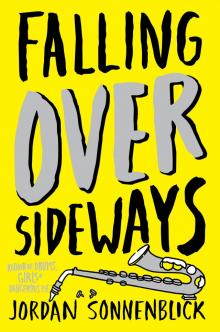- Home
- Jordan Sonnenblick
Notes From the Midnight Driver Page 3
Notes From the Midnight Driver Read online
Page 3
Huh?
“Just like I told you when you first called me about this, nobody wants to deal with a trial for such a small-potatoes case when the defendant is so blatantly guilty.”
“Umm, Uncle Larry, what’s the ‘went well’ part, exactly?”
“The ‘went well’ part is that now the judge will have a couple of free hours to catch up on paperwork this morning, so she’ll be in a good mood for your sentencing.”
“But what’s my sentence going to be?”
“I told your mom this—didn’t she fill you in? You’ve got no priors, you’re a decent student, you play in the school jazz band, for Chrissakes. I think we’re looking at a slap on the wrist for the criminal charges.”
“And what about my license?”
“You’ll probably get it a year or two late.”
He clearly thought this was no big deal, and was kind of staring off distractedly over my shoulder at this point.
“A year or two late? All of my friends are going to have their licenses this year. I can’t believe this. Am I supposed to get a ride to the prom from my mother? How am I going to get to a summer job this year? This is so STUPID. I’m not a criminal. I didn’t hurt anybody! I broke a lawn gnome. A LAWN GNOME!!! Isn’t the judge going to see I’m harmless? Why didn’t you fight this?”
A voice hovered over my left ear, and I knew what my uncle had been looking at. “He probably thought you would prefer human-service time to jail time. And he knew how much I HATE drunk driving.”
Boy, those judges take short breaks.
SOLOMON
You know, you walk into a nursing home, and there’s a lot to contend with. First of all, you’re hit with that smell—like somebody just cooked up a rotting turkey carcass marinated in Lysol.Then there’s the color scheme, with its exciting variations that run the full spectrum from white to off-white to beige.And the PEOPLE! There are grumpy-looking charge nurses ordering everyone around, grim-faced orderlies wheeling patients to and fro in wheelchairs and gurneys, the occasional detached doctor striding through on an urgent mission, and of course the patients. Okay, my mom told me to call them “residents” but who’s kidding who here? They’re sick, right? Therefore, they’re patients.
Residents, my butt.
Anyway, all I’m trying to establish is that as I walked into the Egbert P. Johnson Memorial Home for the Aged to start my sentence, I was in no giggling mood, and the atmosphere therein wasn’t likely to cheer me up anytime soon. I marched up to the third-floor north nurses’ station, where they must have been expecting me. Three women were sitting with their heads sort of gaggled together, and they hushed up with an almost audible snap when I came around the corner from the elevator lounge.
“Hi, my name is Alex Gregory, and I’ve been assigned to work with Mr…umm…Solomon Lewis. Am I in the right place?”
One of the three, a heavyset middle-aged woman whose name tag read CLAUDELLE GREEN, RN, looked me up and down, chuckled, and said, “Oh, you’re in the right place, baby. We got the one and ONLY Solomon Lewis, don’t we, girls?”
“Mmmmm, hmmmm,” added a Miss Juanita Case, LPN, who was much younger, very pretty, and basically snickering in my face. “Your mother sure picked you a good one! Ever since we got our Solomon Lewis the other floors are all envious. Nobody else got anything LIKE a Solomon Lewis. Are you the new volunteer who’s going to make Mr. Lewis all happy and cheerful for us?”
The third member of the trio was Leonora McCarthy, Certified Social Worker, a tiny woman who looked practically old enough to just get out of her chair and into a bed in one of the rooms. She said under her breath, “This ought to be a hoot.” Then she looked at me and pointed to the first door on my right. “We keep Mr. Lewis in three-forty-four, so he’s close to the station here and we can minimize the damage he does, so to speak. You can go in now; he loves getting a new volunteer. In fact, he’s had about four different ones since July. Just one piece of advice: Don’t be nice to him. He’ll eat you up if you let him get an edge.”
The other two echoed her with cries of “You got THAT right” and “You think this one will last through supper?”
You can imagine how delighted I was as I stepped into Room 344.
The room was standard hospital issue: white walls, off-white floor tiles, turkey/Lysol scent. It had no decorations whatsoever—no cards, no “Get Well Soon” balloons, no family pictures. So the only thing I could possibly look at was the man on the bed. He was sitting, propped up on two pillows, staring at the TV with the sound off as he switched channels at lightning speed. His hair was a metallic gray, and his face was surprisingly red, which served to highlight his large, hooked peninsula of a nose. We once learned about Charles Darwin in ninthgrade biology class, and how he found something like thirteen different species of these birds called finches in the Galápagos Islands. I remember each species had a radically different beak shape. One kind used their beaks to make holes in trees. Then they would reach down into the openings at a steep angle and pull out grubs to eat. Well, Mr. Solomon Lewis would have fit in perfectly with those particular finches. Behind the beak, shadowed by his looming single eyebrow, two laser-blue eyes were doing their best to burn a hole in the TV screen. Beneath the beak was a regular, thin-lipped old-man mouth, drawn into the fiercest grimace I’d ever seen.
The overall effect: Solomon Lewis was an ancient, merciless gargoyle, armed with a remote control and a trigger-quick thumb.
I stood there in the doorway for a few minutes, semi-scared to speak. I cleared my throat softly, then more loudly. He had to know I was there, but was clearly dishing out the Silent Treatment. Well, Leonora McCarthy had warned me not to be nice, and I wasn’t necessarily getting all huggy and teary-eyed watching this hawk-man ignore me, so I sat down in the big armchair next to his bed and waited. And waited. And waited. The only sound in the room was the buzz of the overhead lights, and the rattling wheeze of the old man’s breathing. He was a remarkably loud breather.
After a few minutes of staring at his face and hoping he would give in and look at me, I tried tuning into the TV. Which had its own frustrations, because at the exact moment I became interested in any given channel, Solomon Lewis hit the clicker. It was uncanny. For the first but definitely not the last time I almost suspected the old man was reading my mind—like he had the superpower of dialing into the annoyance center of my brain.
When I had just about decided to jump up, block the screen, and burst into a few verses of “Getting to Know You,” Solomon Lewis spoke.
“Sit up in that chair, you little pisher. Didn’t anyone ever teach you about posture?”
“Excuse me, sir?”
“What are you, another slow kid? My last volunteer was such a schmendrick, he needed Velcro shirts because he couldn’t do buttons. I said you should sit up.”
All right, I had known I wouldn’t be walking into a picnic here. But between this guy’s tone and the unfamiliar foreign words he was throwing in, I was too stunned and confused to speak.
So he did the slow-talking thing that you might use for, like, a brain-damaged pet monkey. “Ssss-iiii-tttt uuuu-ppppp. Good boy. Maybe soon you can learn to stand up or even chew food. In the meantime, why are you here irritating defenseless old men when you should be in school, learning to hold a pencil or something?”
“Umm, Mr. Lewis, my name is Alex Gregory. I’m a high school student, and I’ll be spending about ten hours here with you every week until…well, for a while.”
“So, Alex, they send me here to be nursed, and you they send here to keep me out of the nurses’ hair. Do you know what my grandmother would have said about this cockamamie situation?”
“I, uh, don’t think so, sir.”
“Well, I don’t know either. She’s dead, and I’m so forgetful that last week I tried to unlock my room door with my toothbrush. But she would have said something. God, that woman could talk! Once, when we were leaving Poland to come to America, I remember she spent so long kibitzing
with the ticket taker that we almost missed the ship. Finally my grandfather says to her, ‘Sadie, when we get to America, you can’t be holding up people’s business all the time with your kibitzing.’ She says, ‘Irv, when we get to America I won’t say a thing.’ He winks at me and says, ‘Hallelujah, America really IS a new world!’”
I almost laughed out loud, but the moment was lost when another “resident” walked past the doorway behind me. Sol got out of bed, darted over to the door, and said, “Good afternoon, Mrs. Goldfarb.”
Mrs. Goldfarb looked kind of startled and nervous when she saw who was addressing her. She gave a pinched little smile and murmured, “Hi, Sol. How are you today?”
“Fine, fine. But how many times have I told you that you have to put your TEETH in before you leave your room?”
She clamped her hand over her mouth, wheeled on her heels, and scurried back the way she’d come. “Gotcha!” Sol exclaimed with deep satisfaction. “That’s the fourth time this week.”
I was a bit slow to process this. “Umm, Mr. Lewis, her teeth WERE in.”
“A rocket scientist, you aren’t. Of course her teeth were in.”
“But why did you—”
“Alex, boychik, if you’re going to last at all in this crazy house, there’s one thing you need to understand about the old people in here: They need to be kept on their toes. The minute you let them stop thinking, you might as well just put laughing gas in their oxygen tanks, crank it up, and finish ’em off.”
I didn’t have the slightest clue of how to respond to that, so I sat there shifting my weight from foot to foot, studying the stubborn Ring Ding stains on my sneakers. Solomon Lewis strode past me, chuckling to himself between loud breaths, and sat down on his bed. All of a sudden the chuckles were gone, and he was making this horrible “Hoo-hah-hoo-hah” noise. His hands were on his knees, and his head was hunched to his chest. I asked twice whether he needed help, but he didn’t respond. The third time, I jumped up, went over, knelt down right in front of his face, and spoke loudly: “Mr. Lewis, are you okay?”
He glanced up with a mixture of anger and fear that I’d never seen on anybody before. “Don’t—hoo-hah—worry. This is just what—hoo-hah—happens when I’m dying—hoo-hah—you imbecile!”
October 27
Dear Judge Trent,
I am writing to update you on my progress with the human-service project you assigned me. I think it is great that you gave me a chance to right my wrongs and learn from my mistakes, even though my accident did not hurt anybody but myself. However, I have just completed my first visit to the nursing home, where I worked with a very interesting patient resident named Solomon Lewis, and I feel you should change my assignment.
First of all, while I know the assignment is to serve humans, I am just not qualified to assist Mr. Lewis. Apparently, he has some problems with memory and attention that should be handled by a competent mental-health professional, rather than a teenager. He is also, frankly, verbally abusive. Within minutes of meeting me, Mr. Lewis called me an imbecile, said I was “not a rocket scientist” and “irritating,” and suggested that maybe the other pati residents should be mercy-killed. He also berated me repeatedly in some foreign language, which the nurses said must be something called “Yiddish.”
Secondly, nobody alerted me to this ahead of time, but Mr. Lewis is afflicted with a serious health problem called “emphysema.” He started choking to death right in front of me, and I didn’t have the skills to help him. A nurse had to come rushing in with a big mask and give him some kind of emergency breathing treatment. He survived, but it looked like a close call to me. Then when he finally caught his breath, I asked him whether he was feeling better, and he told me to, “Gay kocken offen yom!” I looked on the Internet when I got home, and apparently Mr. Lewis feels that, rather than assisting him at the nursing home, I should “Go take a dump in the ocean” instead.
In closing, I feel that I have grounds for concern here. I am glad to do human service so that I can learn a valuable life lesson about responsibility and trust. However, I am just not qualified to meet Mr. Lewis’s needs. The home should replace me with a psychiatrist/linguist/paramedic/saint, and the court should find me a new assignment that will be less traumatic for my sensitive adolescent mind.
Sincerely,
Alex Gregory
October 29
Dear Alex,
Contrary to your assertions, Mr. Lewis sounds like the perfect match for you.
As I explained to you when we accepted you into the Full Circle pretrial intervention pilot program, the human-service component is only half of the picture. The point of the program is that by working through the challenges and difficulties of serving others, you will ultimately be serving yourself. I look forward to more letters from you so that I can enjoy the unfolding process of your personal growth, and Mr. Lewis’s, as well. In the meantime, you are hereby ordered to continue your service with Mr. Lewis.
Sincerely,
Judge J. Trent
P.S. A Yiddish phrase that might come in handy for your use with Mr. Lewis is “Bluz in toches!” Like Mr. Lewis, I am Jewish, and in the proud language of our people, this means “Blow it out your butt.”
PLAN B
For my second visit to see Solomon Lewis, I had to pump myself up just to make it through the door. All the way on the bus to the home, my inner drill sergeant was delivering a high-energy sermon to my inner coward—who is remarkably similar to my outer coward, now that I think about it.
Drill Sergeant: Buck up now, son.There’s a job waitin’ for you up in that room. Now you’re just going to get in there and…and…and…HUMAN SERVE until I tell you to stop…uh…human servicin’!
Inner Coward: But, sir, I’m not trained for this mission.
Drill Sergeant: First, don’t call me “sir.” I work for a living. Second, you have all the training you need, boy. Now show some oldfashioned red-blooded American guts and GET IN THERE.
Inner Coward: Why should I?
Drill Sergeant: Why? WHY? There ain’t no “why” in this man’s army, son.You are just a weapon. The orders come down, and you attack. Does a gun ask why? Does a tank ask why?
Inner Coward: No, but what about a smart bomb? Does a smart bomb ask why?
Drill Sergeant: Umm…uhh…I’m not too sure about that technical stuff. I mean, I suppose you could program a smart bomb to ask why. But could it ask WHY it asked why? I guess the true question is whether a smart bomb can ever attain true awareness. In the immortal words of Socrates…
Inner Coward: You’re scaring me, sir.
Drill Sergeant: Doesn’t matter.We’ve reached the drop zone. Now go, go, GO. And STOP CALLING ME “SIR”! I don’t know why we let snot-nosed punks like you into the military anyway. When John Wayne was alive, you didn’t see a bunch of lily-livered, weak-kneed, sniveling, scrawny pantywaists tryin’ to make excuses for every…
Inner Coward: Thank you, Sergeant.You’re an inspiration. Honestly.
I paused before entering Mr. Lewis’s room, took a deep breath, and marched myself right in. The old man was sitting up in bed reading a book I had read in school, Angela’s Ashes, by Frank McCourt. So I cleared my throat and tried to start right in with a discussion.
“Good morning, Mr. Lewis. I’m Alex, your volunteer. Remember?”
He just stared at me like I was a walking, talking fungus.
“Anyway, I read that book last year. Great, isn’t it?”
“Who the hell are you? I’ve never seen you before in my life. Nurse. NURSE! Help! There’s a thief in my room. I think he wants to—”
This was alarming. “Mr. Lewis, wait! I’m just your…um…I’m Alex.”
“Help! Alex, the Um, is here to get me. NURSE!”
Claudelle came pounding through the doorway. “Mr. Lewis, calm down. It’s okay.” She gestured to me. “This is just…”
“Alex, the Um.” Then Mr. Lewis started laughing so hard I thought he might start choking again
. “Gotcha! Alex, the Um! Boy, are you two gullible.”
Come to think of it, I kinda hoped he’d start choking again.
“So, Mr. Um, you liked Angela’s Ashes?”
Maybe I could show him I wasn’t so stupid. “Yes, I enjoyed the way he made his memoir feel like fiction.”
“Oh, what a load of chazzerai that is. ‘Made his memoir feel like fiction.’ Ha! Did you like it? Did you cry? This book, do you know where it hit me? Right in the kishkes, it hit me. Pow! Those Irish, they know from suffering, let me tell you.”
“Well, I said I liked it. It was deep.”
“Deep, schmeep! Nurse, are you hearing Mr. Um here? For this, you’re paying school taxes?”
Claudelle shook her head and clicked her tongue as she walked away, leaving me to sink or swim in this riptide of undeserved criticism.
“Listen, Mr. Lewis, I don’t know why you’re picking on me. You liked the book, right? I liked the book. You liked it, I liked it—so don’t torture me, okay?”
Mr. Lewis looked fairly pleased with me all of a sudden. “Call me Sol, Mr. Um. Now that you’ve raised your voice to me in anger, I figure we’re on a first-name basis.”
“I’m sorry, Mr. Lewis. I just didn’t come here to get…”
“Listen, Mr. Um. First of all, I told you to call me Sol. Second of all, don’t apologize for showing some backbone. Especially for a slow kid like you—no offense—you’re going to need some of that chutzpah to get you through life. Everybody needs a meal ticket, and if you aren’t blessed with looks or brains, a big mouth isn’t such a bad substitute.”
Wow, that was the most backhanded compliment I ever heard. But at least I’ve got chutzpah, whatever that is.
“Anyway, Mr. Um, what are we going to do today? We’ve already had our literature lesson for the week, so what do you think? Some chess, maybe? Or for you, checkers? Tic-tac-toe? Go fish? War?”

 Curveball: The Year I Lost My Grip
Curveball: The Year I Lost My Grip Dodger for Sale
Dodger for Sale Are You Experienced?
Are You Experienced? Drums, Girls & Dangerous Pie
Drums, Girls & Dangerous Pie Dodger and Me
Dodger and Me The Secret Sheriff of Sixth Grade
The Secret Sheriff of Sixth Grade The Boy Who Failed Show and Tell
The Boy Who Failed Show and Tell Drums, Girls, and Dangerous Pie
Drums, Girls, and Dangerous Pie Dodger for President
Dodger for President Notes From the Midnight Driver
Notes From the Midnight Driver After Ever After
After Ever After Zen and the Art of Faking It
Zen and the Art of Faking It Falling Over Sideways
Falling Over Sideways